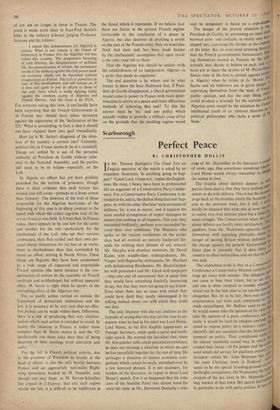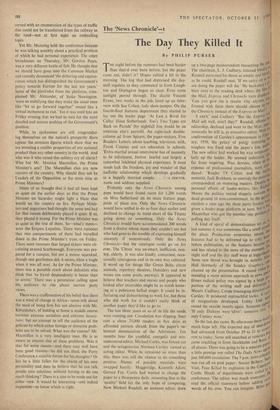Scarborough
Perfect Peace
By CHRISTOP
HER HOLLIS
IN Mr. Terence Rattigan's The Final Test an English spectator of the match is asked by an impatient American, 'Is anything going to hap- pen?' Good Lord, I hope not,' replies the English- man. He must, I fancy, have been in professional life an organiser of a Conservative Party Confer- ence. For a Conservative Party Conference is in- tended to be, and is, the dullest thing that ever hap- pens. As with the elder Sheridan 'such an excess of dullness, Sir, is not in nature,' and it requires the most careful arrangement of expert managers to ensure that nothing at all happens. This year they succeeded brilliantly, perhaps even succeeded be- yond their own ambitions. The Ministers who spoke to the various resolutions on the earlier days had all evolved an entirely foolproof for- mula for robbing their debates of any interest. Mr. Marples with drunken motorists, Sir David Eccles with middle-class undergraduates, Mr. Vosper with flogworthy delinquents, Mr. Macleod with defederating Rhodesians, Mr. Boyd-Carpen- ter with pensioners and Mr. Lloyd with taxpayers —they one and all announced that in good time they would have something fearfully interesting to say, but that they were not going to say it now. Even when there was an issue with which they could have dealt they neatly sidestepped it by talking instead about one with which they could not deal.
The only Minister who did not conform to the formula of saying that this was not the time to an- nounce what he had in his mind was Lord Home. Lord Home, in his first English appearance as Foreign Secretary, made quite a good and forth- right speech. He warned the Socialists that, when Mr. Khrushchev talks about peaceful co-existence, he does not envisage a situation in which we and he live peacefully together for the rest of time. He envisages a situation of intense economic com- petition which cannot be easily smoothed over by a few honeyed phrases. It is not necessary, for readers of the Spectator, to repeat in detail Lord Home's speech. For it so happened that his criti- cism of the Socialist Party was almost word for word the same as Mr. Desmond Donnelly's criti- dm of Mr. Macmillan in the Spectator a cote of weeks ago. One sometimes wondered whether' Lord Home would always remember to chance the names in time. The trouble about defence debates in "-I 01' parties these days is that they have nothing vi"1, - soever to do with defence. This is not the occa° to go back to the troubles which the Socialists ran , into in the previous week, but it will, I thine' hardly be disputed that what was at issue was n, in reality two rival defence plans but a bitter tell sonal struggle. The Conservatives when they ir about defence are hardly more satisfactory. Tlieni speakers, from Mr. Watkinson upwards, COnleo themselves with repeating platitudes about bpi danger of leaving Britain without defences• ele, the charge against the present Government the fence plan is precisely that it dots leave `rti country in effect defenceless. and on that 110 wo was said. fi The undoubted truth is that at a Conservtl`' Conference a Conservative Minister could by large get away with murder. The delegates bani, not come to hear their rulers, but to sec the ii and one is often tempted • to wonder whetherhes would not be the best plan to cut out the speecmsi altogether. But, let us be fair, there was not ll'ert acquiescence, nor were such complaints as Who made unintelligent. Mr. Balfour used to SiY tan he would sooner take the opinion of his v:1101114, take the opinion of a party conference, and cleiss tainly it would 'be hard to imagine anybody[ suited to impose policy on a nation's rulers' n' plaintiffs did not complain that the Minister'''of nounced no policy. They complained ratlicrbey the 'almost insolently casual way in which top evaded their issues—of the jargon and the colt is wool which did service for platform oratory' iIel Swindon—which Mr. John Betjeman has Op 'the most Christian town in England'--41iese seems to be the special breeding-ground of I eel forthright complainers. On Wednesday the la reel ovation of the day went to Mr. Manning, a hint way worker of that town. His speech had 11°tcorr in particular to do with party politics. It was cerned with an enumeration of the types of traffic that could not be transferred from the railway to the road—not at first sight an enthralling topic.
Yet Mr. Manning held the conference because he was talking sensibly about a practical problem of which he had personal experience. The other Swindonian on Thursday, Mr. Gordon Pears, was a very different kettle of fish. He thought that we should have gone into the Common Market and roundly denounced 'the dithering and equivo- cation which has distinguished the Government's policy towards Europe for the last ten years.' Some of the platitudes from the platform, com- plained Mr. Alexander, of Stoke Newington. 'were so stultifying that they make the usual ones like "let us go forward together" sound like a virtual incitement to riot.' Yet it was'until late on Friday evening that we'had to wait for the most detailed and serious probing of the Government's position.
While its spokesmen are still congratulat- ing themselves on the nation's prosperity there appear the ominous figures which show that we are investing a smaller proportion of our national product than any other country in the world. And who was it who raised this solitary cry of alarm? Who but Mr. Maurice Macmillan, the Prime Minister's son? The Macmillan clan are now masters of the country. Why should they not be Leaders of the Opposition at the same time as Prime Ministers?
Many of us thought that it had all been kept so quiet on the earlier days so that the Prime Minister on Saturday might light a blaze that Would set the country on fire. Perhaps Minis- ters and organisers had thought the same and had for that reason deliberately played it quiet. If so, they played it wrong. For the Prime Minister was as quiet as the rest of them. So—what's more— were the Empire Loyalists. There were rumours that two compartments of them had travelled down in the Prime Minister's train on Friday. There were rumours that forged tickets were cir- culating around Scarborough. Everyone was pre- pared for a rumpus, but not a mouse squeaked, though one gentleman did, it seems, blow a bugle when it was all over. As for the Prime Minister, there was a passable crack about defeatists who think that `to travel despondently is better than to arrive.' There was a peroration calling upon his, audience to rise above narrow party views.
There was a reaffirmation of his belief that there was a wind of change in Africa—some talk about the need of being firm but not abusive with Mr. Khrushchev, of holding at home a middle course between extreme socialism and extreme laissez- faire, but no attempt to tell the audience of the policies by which either foreign or domestic prob- lems are to be solved. What was the reason? Mr.
Macmillan is a very intelligent man. He is as aware as anyone else of these problems. Was it that for some reason—and there may well have been good reasons—he did not think the Party Conference a suitable forum for his thoughts? Or has he a little fallen for the charm of his own personality and does he believe that he can talk people into solutions without having to do too much thinking? There is a case to be made out for either view. It would be interesting—and indeed important—to know which is right.



















































 Previous page
Previous page